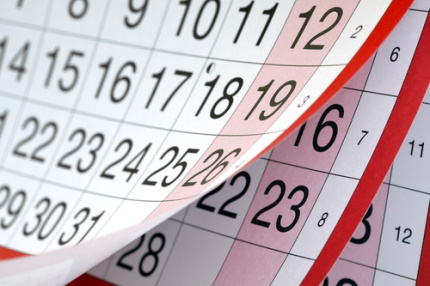There is a wide range of stock market investing experience among the subscribers to my Dividend Hunter service. From the emails I receive, I know that it is easy for both beginners and more experienced investors to have trouble keeping up with how companies announce dividends and when you actually see the cash in your brokerage account.
Note: one tool that helps is my Monthly Dividend Paycheck Calendar that I give every Dividend Hunter member. It tells them when they need to own each stock and when to expect their dividend payment. And it’s updated every month too.
Here is a quick primer on everything I think would help you keep track of when your income stocks will pay dividends.
Dividend Announcements
First, ongoing dividends are not guaranteed from any stock. Investors saw this first hand last spring and early summer as companies started cutting dividends in response to the market crash and economic fallout from the pandemic.
A company’s board of directors will review the financial results of the business each quarter and then announce the next dividend or distribution. Monthly dividend stocks may or may not announce three monthly payments at a time. Each new dividend announcement will include at least three pieces of information:
- The amount of the dividend payment per share.
- The record date.
- The payable or payment date.
The announcement may also include an ex-dividend date, but it is not required. The ex-dividend is determined from the record date.
Shareholder of Record
You are entitled to, and will receive, a dividend payment if you are a shareholder of record on the record date. To be an owner of record, you must have purchased the shares with a trade or trades that settled on or before the record date. Settlement is the period it takes for a stock trade to become official. When you buy shares through your brokerage account, the trade officially settles two business days later.
The two days are to give you time to deliver the money to your broker and the seller to deliver the shares. In the modern world, these transactions happen electronically, and your broker shows results in your account almost immediately; yet under the SEC rules, you are not officially a shareowner until two business days after you get a filled buy order in your brokerage account.
Ex-Dividend Means No Dividend Would Be Earned
Since we know it takes two days for a stock purchase to settle and become official, someone who buys shares one business day before the record date will not become a shareholder of record until one day after the record date, and therefore will not receive the dividend. Thus, a stock goes “ex-dividend” one business day before an announced dividend record date. You need to know several facts about the ex-dividend date.
If you buy shares the day before the ex-dividend date (two days before the record date) and sell on the ex-dividend date, you will be a shareholder on the record date and earn the dividend. On the ex-dividend date, the share price is adjusted and usually starts trading at the previous closing price minus the dividend amount. For example, if a stock closed at $25.00 the day before the ex-dividend day and a $1.00 dividend was declared, the stock will open on the ex-dividend date at $24.00 per share. The financial websites will show this as no change in the share price. If the stock is at $24.10, the difference will show as up $0.10 for the day.
This share price drop keeps traders from taking advantage by buying and holding shares for just one day to earn the dividend. New investors often get excited by the idea of short-term “dividend capture” trades. The mechanics of the ex-dividend pricing prevent that strategy from actually producing profits.
Business days are the days the stock exchange is open for trading. When counting back from the record date, we do not count holidays and weekends. I like to buy shares to add to a position after a stock goes ex-dividend. It feels like a deal to purchase shares at a lower price.
When Do You Get the Money?
Dividend-paying companies transfer the money to your broker on the payment date listed in the dividend announcement. Your brokerage account may show the deposit on the declared payment date or one day after the payment date.
In order of occurrence, the timing starts with a dividend announcement, then the ex-dividend and record date a couple of weeks later, and the payment after another two weeks, resulting in about a month between the dividend announcement and when the cash distribution lands in your brokerage account.
Be aware, however, that this is just the average, and the spread between dates can vary significantly. One of our long term Dividend Hunter portfolio stocks announces a dividend up to seven weeks before the ex-dividend date.
Meanwhile, another portfolio stock that happens to be one of my favorites for high-yield investors pays the dividend a full month after the record date.
Dividend announcements may be separate news releases or included in a quarterly earnings press release.






